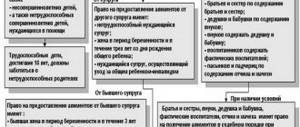MIP online legal encyclopedia - » Family law » Articles on alimony » Responsibilities of spouses for mutual maintenance of each other and children
Get an expert’s opinion on mutual support for each other and children in two clicks
From the moment of marriage, one of the significant family responsibilities is financial support for each other.
Grounds for collecting alimony from a spouse
The responsibilities of spouses for mutual maintenance are prescribed in the RF IC.
From the moment of marriage, one of the significant family responsibilities is financial support for each other. If the couple cannot voluntarily agree on the fulfillment of this obligation, then this issue is submitted to the court for decision. Married and former spouses have the right to demand financial support, if necessary.
The status of partners in an unofficial marriage does not give any of them the right to demand financial assistance. This does not depend on the duration of the relationship. The obligations of spouses for mutual maintenance do not apply to couples whose marriage is not officially registered.
All cases in which one of the spouses has the right to collect financial support are prescribed in the legislation of the Russian Federation.
Articles 84, 86, 88 of the Family Code state the basis for the collection of alimony as one of the obligations of the spouses for mutual maintenance. According to Article 84, during pregnancy and three years after childbirth, the spouse has the right to support her husband, provided that he is the father of the child. If the child has physical or psychological developmental disabilities, then the wife has the right to financial assistance until the child turns 6 years old.
Article 86 stipulates the rights of the person with whom the child lives on alimony from the mother of this child. In order for a man to obtain alimony from his wife, the following facts are required:
- So that a healthy child lives with his father until he is three years old, and a child with physical or mental disabilities - until he is six years old.
- So that the wife is the biological mother.
- So that the wife has the opportunity to provide financial support.
Only if the described aspects are present will the court approve the husband’s claim for alimony from his wife, who is the mother of the child. This right does not depend on the availability of work and the financial status of the man. It follows from Article 86 of the Family Code that a person’s right to alimony cannot be conditioned by his need for financial assistance or incapacity for work.
1. Spouses are obliged to financially support each other. 2. In the event of refusal of such support and the absence of an agreement between the spouses on the payment of alimony, the following have the right to demand the provision of alimony in court from the other spouse who has the necessary means for this: a disabled spouse in need; wife during pregnancy and for three years from the date of birth of a common child; a needy spouse caring for a common disabled child until the child reaches the age of eighteen or a common child who has been disabled since childhood, group I.
Commentary on Article 89. 1. The obligation of spouses to financially support each other rests only with persons in a registered marriage. It does not apply to persons in de facto marital relationships. 2. Spouses have the right to enter into an agreement on the provision of maintenance. An agreement on behalf of an incapacitated spouse is concluded by his guardian. The provisions of Chapter 16 of the Family Code apply to the conclusion of agreements between spouses on the payment of alimony (see commentary to it). The conditions, procedure and amount of maintenance provided by one of the spouses to the other are determined by this agreement. A provision for paying alimony to a spouse can also be included in a marriage contract (see Article 42 of the Family Code and the commentary thereto). The agreement may provide for the provision of maintenance to one of the spouses, regardless of whether the spouse receiving alimony is disabled and in need. Spouses, in particular, may provide in an agreement for the right to alimony for an able-bodied spouse who, by common agreement of the spouses, manages the household and therefore does not have an independent source of income. Persons who are in a de facto marital relationship, that is, for a long time leading a common household and living together as spouses, but without registering a marriage, can enter into agreements on the provision of maintenance, to which the rules of the UK governing agreements on the payment of alimony will apply in the manner analogies of the law (see Article 5 of the UK and the commentary thereto). 3. In the absence of an agreement, the spouse, and if he is incapacitated, his guardian has the right to file a claim for the recovery of alimony in court, subject to the conditions provided by law. The obligation to provide maintenance to one's spouse falls on the other spouse only if he himself has the necessary means to pay alimony. The availability of the necessary funds is understood as such a level of security for the spouse at which, after paying alimony, he himself will remain provided with funds in the amount of at least the subsistence level. The availability of the necessary funds is determined by the court, taking into account all the circumstances of a particular case. The subsistence minimum is only an approximate criterion (as in determining need). The court has the right, in the presence of special circumstances, to consider that the spouse does not have the necessary funds, even if after paying alimony he will still have funds in the amount of the subsistence minimum, for example, if the paying spouse, for health reasons, needs significant funds for treatment, etc. When determining the availability of necessary funds, all types of earnings and income of the spouse are taken into account; whether he has income-generating property; the presence of persons to whom he is legally obliged to provide maintenance and who are actually dependent on him; the presence of mandatory payments that he must make based on a court decision or for other reasons. It does not take into account the presence of persons (parents, adult children) to whom the spouse paying alimony may, in turn, apply for alimony, having become needy as a result of paying alimony to his spouse. The obligation to pay alimony to your spouse rests with the other spouse, regardless of his ability to work and legal capacity. It is possible to involve a minor spouse who entered into marriage as a result of lowering his age of marriage to pay alimony. A disabled spouse in need has the right to compulsory collection of alimony. The moment when the disability arises does not matter: it can arise both before and during the existence of the marriage. The incapacity and neediness of a spouse are determined in the same way as when collecting alimony for adult children (see Article 85 of the Family Code and the commentary thereto). A wife also has the right to demand alimony from her husband during pregnancy and for three years from the date of birth of a common child. In this case, the right to receive alimony is not related to the presence of need and disability. Alimony is collected even if the wife is provided with funds in an amount exceeding the subsistence level. This is due to the fact that during pregnancy, breastfeeding and caring for a young child, there is a need for numerous expenses (for additional food, treatment, special clothing, rest, special procedures, etc.), which must be borne by both spouses . The right to alimony from the other spouse is also recognized for a needy spouse caring for a common disabled child under 18 years of age or a person disabled since childhood of the first group. The disability group for a child under 16 years of age is not determined. The right to alimony does not depend on whether the spouse seeking alimony is disabled. Since disabled people of the first group require constant outside care, the spouse caring for a disabled child is usually forced either not to work at all or to work part-time, which significantly affects his ability to earn income. The adverse financial consequences of the need to care for a disabled child must be borne equally by both spouses, and therefore the spouse providing such care has the right to recover funds for his maintenance from the second spouse. The need of the spouse applying for alimony is determined in accordance with the general procedure (see Article 85 of the Family Code and the commentary thereto).
The procedure for collecting alimony from spouses to each other
Some men think that if a wife stays at home and does not work, then she does not deserve money. Does washing, ironing, cooking and caring for a child mean it’s not hard work? When getting married, you need to understand that in addition to the ring and stamp in the passport, there are obligations to each other. The law establishes the obligation to provide financial support to spouses. These obligations apply to both husband and wife. A woman and a man can demand alimony if their situation complies with the points provided for by law. Typically, spouses voluntarily agree on the amount and timing of alimony payments. But if it doesn’t work out voluntarily, then these limits are set by the court. To do this, you must file a claim.
The plaintiff submits an application to the magistrate at his own place of residence or at the place of residence of the defendant.
Alimony is paid only in monetary units, and the plaintiff does not pay state duty.
Reasons for alimony
In order for one spouse to have the right to demand financial support from the other, the law provides for the following conditions:
- Lack of peace agreement between spouses.
- Refusal of one spouse to provide financial support to another, disabled person.
- Availability of the necessary funds from the defendant to provide financial support to the plaintiff.
Current and former spouses have the right to claim financial support.
Methods for a peaceful agreement between spouses:
- An oral agreement when the couple agrees on the amount of payments and the timing voluntarily. The amount can be completely different if it suits both parties. To guarantee payment, spouses can enter into a written agreement and have it certified by a notary. Such an agreement does not determine the living conditions and procedure for maintaining the child.
- Submitting an application at the place of receipt of the payer’s income. In some cases, the party seeking support submits the application at the other party's place of work. If the company approves the application, then the payer receives part of the salary, and the applicant receives the assigned percentage.
- Acquisition of property rights by a child. In the case of a gift of real estate, one of the parents is automatically exempt from paying alimony.
Who is entitled to alimony:
- Disabled spouse. This is a person who has reached 55 years of age (woman) and 60 years of age (man), or is recognized as a disabled person of groups 1, 2, 3, regardless of age.
- A wife during the period of bearing a child until he is three or six years old. In this case, the spouses must be officially married. If the relationship of the spouses is not registered in the registry office, then the woman has no right to maintenance. The condition applies to the husband if he is the biological father of the child.
- A spouse who cares for a joint disabled child until he turns 18.
When filing a claim, the following conditions must be met:
- Registered marriage, with confirmation of a marriage certificate.
- Submitting a report on the income and expenses of the needy spouse.
- The plaintiff must care for a disabled child.
Responsibilities and rights of spouses
All marital rights and obligations are divided into the following two categories:
- property;
- others are of a non-property nature.
The first responsibilities are legally regulated in various laws of the Russian Federation. Non-property rights are reflected in the RF IC.
Rights and responsibilities of spouses
Non-property
According to Art. The RF IC considers each spouse equal in their rights and various responsibilities in relation to each other. However, being married, they independently perform the following actions:
- choose a specific occupation, place of work;
- choose a suitable place of residence;
- make a definite decision to receive a new surname (from the husband), which is indicated in the wife’s passport after the wedding. Moreover, the wife retains the right to retain her maiden name.
Important! Both spouses have equal rights in relation to their own children. As a result, issues of raising a child and providing him with everything he needs are resolved jointly.
Article 31 of the Family Code of the Russian Federation “Equality of spouses in the family”
Property sphere
One of the spouses is not alienated the property in favor of the other that belonged to him before the official marriage.
This rule also applies to cash. Various material items that are purchased after the wedding belong to both spouses. Attention! An exception to the general rules are considered to be various gifts or cars, apartments or other property that were received as a result of a certain inheritance. Also, various personal belongings (except luxury items) are not shared between both family members.
Both spouses do not share such debt obligations of a property nature - specific debts and loan funds that were spent on the needs of their family (Art. RF IC). Otherwise, joint and several civil liability is observed.
If there is an apartment or other common property, division and other legal procedures with it are carried out jointly. Before conducting an official alienation transaction (sale, pledge, etc.), they must obtain permission from the second spouse.
Read also: Is it possible to return maternity capital from a mortgage during a divorce?
Article 45 of the Family Code of the Russian Federation “Foreclosing on the property of spouses”
Amount of alimony recovery
Whether the spouses are married or divorced, alimony for a minor child is calculated in shares of the defendant’s income:
- For one child – 25% of income.
- For two children - 33.3% of income.
- For three or more – 50% of income.
Depending on the financial situation of the plaintiff and defendant, the court may establish a lower amount of alimony payments.
If spouses agree with each other voluntarily, then the percentage amounts may be different. But if the defendant is not satisfied with the amount, and it is less than generally accepted, then a claim can be filed and the court will assign a fixed amount, taking into account the defendant’s income.
It can be summarized that in order to submit an application for alimony payment, the presence of factors that are provided for by law must be present. The timing and amount of monetary support is decided by the court, in the event that the spouses could not agree peacefully among themselves.
If there are aspects prescribed by law, then one party has the right to demand financial support, regardless of its financial situation. If the factors are not sufficient, then there is no right to demand alimony, regardless of legal capacity or availability of work.
To avoid disputes and misunderstandings, it is best for citizens who decide to have a child together to register the relationship officially. Thus, all questions will automatically disappear when filing a lawsuit, if anything happens.







